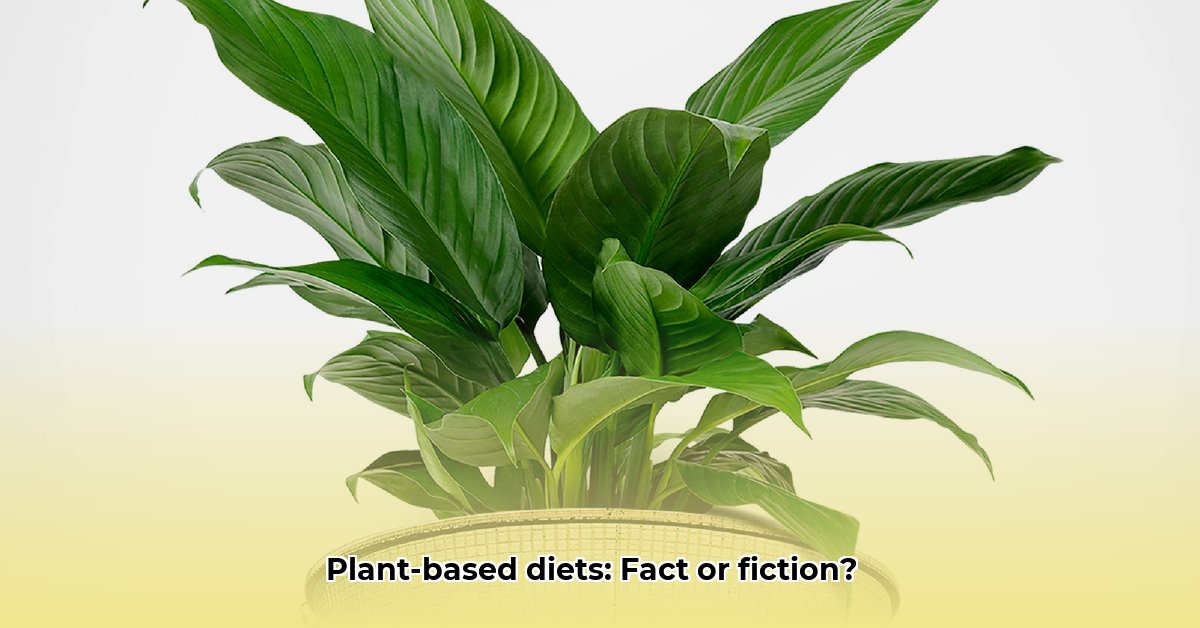The rise of plant-based diets is undeniable, and a significant driver of this trend is the proliferation of documentaries exploring the topic. These films present compelling narratives, showcasing potential health benefits, environmental advantages, and ethical considerations. However, it’s crucial to approach these documentaries with a critical eye, separating evidence-based facts from potential biases and oversimplifications. This article delves into the world of plant-based diet documentaries, providing a balanced perspective and actionable insights. For a structured approach, check out this 30-day plan.
Understanding Plant-Based Diets Through Documentaries
Plant-based diet documentaries have become a cultural phenomenon, influencing dietary choices and raising awareness about the impact of our food systems. While these films can be incredibly informative and inspiring, a nuanced understanding is vital. They can spark conversations about health, environmental impact, and animal welfare, but viewers should remain discerning.
The Promises and Pitfalls of Health: Evaluating Documentary Claims
Many documentaries promote the impressive health benefits of plant-based diets: weight management, reduced risk of heart disease, and improved blood sugar control. While numerous studies support these claims for well-planned plant-based diets, documentaries sometimes overstate the benefits and present plant-based eating as a universal cure-all. The China Study, for example, is often cited but also debated for its methodology and conclusions.
Remember, a healthy dietary pattern, whether plant-based or omnivorous, should be personalized, considering individual factors like age, activity level, genetics, and pre-existing health conditions. Food sensitivities, allergies, and specific metabolic needs can all influence the ideal dietary approach. Before making significant dietary changes, consulting with a doctor or a registered dietitian is paramount. The optimal approach involves a balanced, tailored, and evidence-based plan.
Environmental Impact: Unveiling the Truth About Sustainability
Documentaries frequently illustrate the detrimental environmental impact of animal agriculture, highlighting greenhouse gas emissions, deforestation, and water pollution. Films like Cowspiracy have been instrumental in raising awareness. While animal agriculture undeniably contributes to environmental problems, it’s essential to recognize that not all plant-based food production is inherently eco-friendly.
Intensive farming practices, like monoculture, can lead to soil depletion, reduced biodiversity, and increased reliance on water and energy inputs. Almond production in California, for example, requires significant water resources. Palm oil plantations have contributed to deforestation in Southeast Asia. To minimize your environmental footprint, consider how your plant-based foods are produced. Prioritize sustainable farming practices focused on biodiversity, minimal environmental impact, and reduced reliance on pesticides and synthetic fertilizers. Many documentaries, however, need to dive deeper into the complexities of sustainable plant-based food production, including transportation and packaging considerations. Did you know that minimizing food waste can also significantly reduce your environmental impact, regardless of your dietary choices? Support local farmers markets and community-supported agriculture (CSA) programs where possible to reduce transportation emissions and support local economies.
Ethical Considerations: Assessing Moral Implications in Plant-Based Choices
The ethical arguments presented in documentaries, often featuring disturbing images of factory farming practices, resonate deeply with many viewers. While these concerns about animal welfare are valid, ethical considerations extend beyond factory farms. We must also consider the broader environmental impact of industrial agriculture, the working conditions of agricultural laborers, and the ethical implications of emerging food technologies like lab-grown meat.
Are lab-grown meats a better ethical choice, or do they present unforeseen consequences? Is their production truly sustainable long-term? What are the labor practices in the production of plant-based foods? These complex issues require careful consideration. Some documentaries might overemphasize farm animal welfare while overlooking the broader ethical dimensions of environmental sustainability, fair labor practices, and food justice. A comprehensive perspective requires understanding diverse viewpoints and avoiding oversimplifications. Consider the impact of your food choices on all stakeholders, from animals to farmworkers to the environment.
Becoming a Critical Viewer: How to Decode Plant-Based Diet Documentaries
Not all documentaries are created equal. Some may selectively use data, misinterpret research findings, or oversimplify complex topics to support a particular narrative. Therefore, critical thinking is paramount when watching these films.
Here’s how to critically approach plant-based diet documentaries:
- Verify the Evidence: Ensure claims are supported by credible scientific studies and peer-reviewed research. Look for citations and verifiable sources. Beware of documentaries relying solely on personal anecdotes or testimonials without scientific backing. Check for conflicts of interest and potential biases in the research cited.
- Evaluate the Source: Investigate the filmmakers’ potential biases by researching who produced and funded the documentary. A documentary funded by an organization with a specific agenda may present a skewed perspective. Look for transparency in funding sources and consider the filmmakers’ previous work.
- Seek Diverse Perspectives: Watch multiple documentaries to gain a broader understanding of the topic. Compare and contrast the information presented, and supplement your viewing with reviews and critiques from independent sources. Read books, articles, and scientific papers that present different viewpoints.
- Consult Experts: If you have specific questions or concerns, seek guidance from registered dietitians, nutritionists, or other qualified healthcare professionals. They can assist you in creating a personalized and sustainable dietary strategy. A registered dietitian can help you navigate the complexities of plant-based nutrition and address any potential nutrient deficiencies.
Embracing Change: Taking Action for a Sustainable Future
Plant-based documentaries can inspire action, motivate change, and promote a more equitable and sustainable food system. Even small actions can collectively create a significant impact.
| Stakeholder Group | Actionable Steps |
|---|---|
| Individuals | Gradually incorporate more plant-based meals, explore diverse plant-based recipes, learn about balanced nutrition, reduce food waste, support local and sustainable food producers, advocate for policies that promote sustainable agriculture, and educate others about the benefits of plant-based diets and sustainable food systems. |
| Governments | Invest in research on sustainable food systems, implement policies that support sustainable agriculture, regulate food labeling for accuracy and transparency, promote consumer education on healthy and sustainable eating, incentivize plant-based food production, and support farmers transitioning to sustainable practices. |
| Food Businesses | Increase the availability and affordability of plant-based options, adopt more environmentally friendly production practices, improve supply chain transparency, invest in research and development of innovative plant-based products, collaborate with farmers to promote sustainable agriculture, and reduce food waste throughout the supply chain. |
| Researchers & Scientists | Conduct more comprehensive long-term studies on plant-based diets, investigate alternative protein sources, address knowledge gaps in sustainable agriculture, communicate research findings clearly to the public, collaborate with policymakers and industry to promote evidence-based practices, and develop innovative technologies to improve the sustainability of food production. |
Ultimately, shifting toward a more plant-based diet is not about adhering to rigid rules or seeking absolute answers. It’s about making informed choices, consuming mindfully, and acting responsibly. Critical engagement with information and consistent steps will help you contribute to a healthier and more sustainable future. Educate yourself, advocate for change, and support businesses and organizations that are working to create a better food system.
How to Plan a Nutritionally Complete Plant-Based Diet for Sustainable Living
Plant-based documentaries often highlight the potential of veganism for a healthier and more sustainable lifestyle. But simply cutting out animal products isn’t enough. Thriving on a plant-based diet requires careful planning and attention to specific nutrients. Here’s a practical guide to ensure you’re meeting your nutritional needs while minimizing your environmental impact.
Navigating the Plant-Based Landscape
Documentaries play a powerful role, shaping perceptions of plant-based diets. They present compelling arguments, but critical thinking is essential. Some showcase the undeniable health benefits – while others highlight the environmental impact of animal agriculture. Are these portrayals entirely accurate? Understanding the nuances of plant-based nutrition is key.
The Health Benefits: Separating Fact from Fiction
Many studies confirm the link between plant-rich diets and reduced disease risk. However, documentaries sometimes oversimplify the nuances. How to plan a nutritionally complete plant-based diet for sustainable living requires understanding individual nutrient needs. We need to address potential deficiencies in B12, vitamin D, calcium, iron, zinc, iodine, and omega-3 fatty acids. Fortified foods and supplements can help bridge these gaps.
Supplementation may be necessary, depending on individual needs and dietary choices. Consult a healthcare professional to determine the right supplements for you.
Environmental Impact: Cultivating a Greener Plate?
The environmental argument for plant-based eating is compelling. Shifting to plant-based diets can reduce our environmental footprint. But that’s only part of the picture. Sustainable farming practices, reducing food miles, and minimizing waste are equally important considerations. Choosing organic and locally sourced produce can further minimize your impact. Minimizing our impact requires a holistic approach.
Ethical Considerations: The Moral Compass of Food Choices
Many documentaries explore the ethical dimensions of plant-based choices. Concerns about animal welfare and land use are driving factors for many people adopting plant-based lifestyles. Consider the ethical implications of your food choices. Are your actions aligned with your values? Supporting fair trade and ethical sourcing can help ensure that your food choices are aligned with your values.
Addressing Practical Challenges
Successfully transitioning requires planning. It’s not just about eliminating meat; it’s about how to plan a nutritionally complete plant-based diet for sustainable living. This includes:
- Gradual Transition: Slowly incorporate
- Why Am I Always Thinking About Food? Your Body and Brain Explain - February 2, 2026
- Healthy Eating Is About Quality, Not Just Calories - February 1, 2026
- Healthy Living Products to Elevate Your Wellness Routine - January 31, 2026










